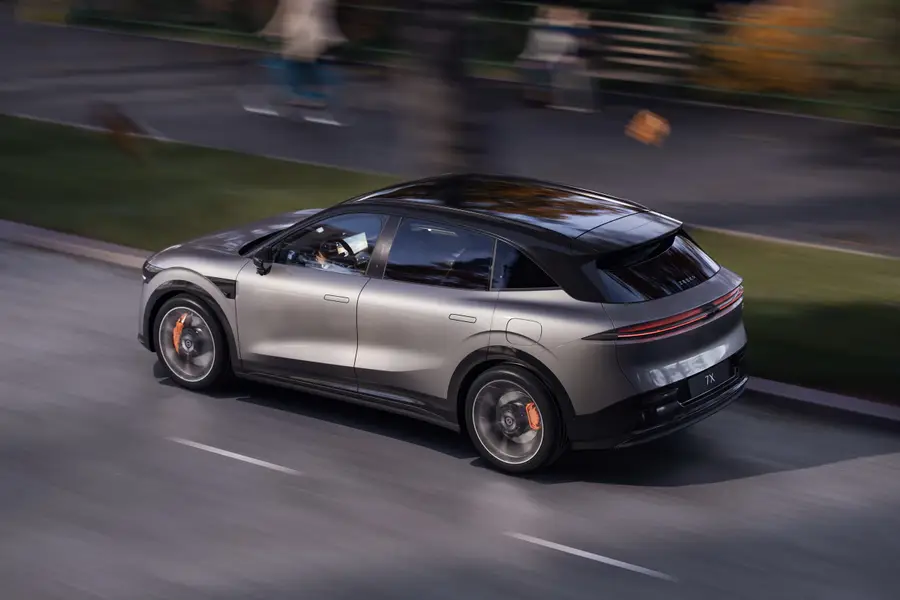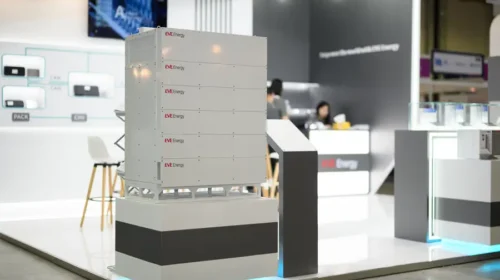Zeekr gets set to drive off Wall Street, just a year after arriving

The company’s proposed privatization is part of an ongoing effort by parent Geely to consolidate its many listed units
Key Takeaways:
- Zeekr has received a privatization bid from Hong Kong-listed parent Geely, which is offering to buy its shares at a 20% premium
- The privatization, just a year after Zeekr’s New York IPO, is being driven by several factors, including an increasingly hostile environment for Chinese companies on Wall Street
By Doug Young
Easy come, easy go.
That’s what electric vehicle maker Zeekr Intelligent Technology Holding Ltd. (ZK.US) is telling investors, as it looks set to drive off the New York Stock Exchange just a year after floating its shares. Zeekr’s short stint as a public company was mildly profitable for investors, who would pocket a nifty premium of more than 20% at the privatization offer price compared with the IPO price.
There are a few elements driving this offer, which is coming from the company’s majority shareholder, Hong Kong-listed Geely Auto (0175.HK), which already owns 65.7% of Zeekr’s stock. The biggest driver appears to be a desire by Geely founder Li Shufu to consolidate his sprawling auto empire around a few listed companies.
A second element is political, as Chinese companies find an increasingly hostile environment on U.S. stock exchanges. That reality has been emphasized several times in recent months, as a few politicians suggest that some or all Chinese companies should be forced off U.S. stock exchanges. A privatization would make Zeekr a 100%-owned subsidiary of Geely Auto, whose Hong Kong listing looks much safer than Zeekr’s own New York listing.
Zeekr made headlines in May last year when it raised $440 million through its New York IPO, becoming one of the largest new U.S. listings by a Chinese company after several years of relative inactivity due to a dispute between the U.S. and Chinese securities regulators. The two sides resolved that dispute with a landmark information-sharing agreement, paving the way for a resumption of major deals.
But now U.S. politicians are once again threatening to limit Chinese listings in the U.S. over several concerns, including data security and the use of U.S. capital markets to raise funds by companies with links to China’s defense industry. Zeekr doesn’t really fall into either of those categories, since most of its sales are in China and its cars are for civilian use. Still, it may be feeling unsettled by all the anti-Chinese rhetoric lately.
Under the proposed buyout, Geely Auto would pay Zeekr shareholders $25.66 for each of their U.S.-listed American depositary shares (ADS), according to Geely Auto’s announcement on Wednesday in Hong Kong. Shareholders could elect to receive the money in cash, or in exchange for 12.3 Hong Kong-listed Geely Auto shares for each Zeekr ADS. The price represents a 20% premium to Zeekr’s trading price over the last 30 trading days prior to disclosure of the offer.
“The proposed privatization is expected to create a unified listing platform for the group, enhancing the competitiveness of the group’s passenger vehicle business by fully integrating Zeekr’s assets and resources,” Geely Auto said. “It will also facilitate the group’s determination of Zeekr’s future strategic direction to address global market and economic challenges.”
Zeekr’s shares rose to close at $25.19 the day of the announcement, putting them about 2% below the offer price. In a somewhat unusual development, the stock continued to rise on Thursday and closed $26.06, slightly above the buyout price. That could indicate investors believe that Geely Auto will ultimately raise its bid.
Consolidating its companies
As we noted earlier, and as Geely Auto pointed out, the main driver behind this deal really does seem to be Li Shufu’s desire to consolidate and simplify his many listed companies. Geely Auto was the first of those, floating shares in Hong Kong in 2004. More recently the company’s Volvo (VOLCAR-B.ST) and Lotus Technology (LOT.US) car-making units have also gone public, both using assets obtained via acquisitions of European companies.
Geely’s other listed units include two smart car technology companies, U.S.-listed Ecarx (ECX.US) and Hong Kong-listed iMotion (1274.HK). In addition, a plan to list its CaoCao ride-hailing company in Hong Kong has been cleared by China’s securities regulator, and looks likely to happen in the next month or two.
Li engineered a major consolidation move of his empire last November when Zeekr announced it would acquire 51% of Lynk & Co, Geely’s high-end car unit, for $1.3 billion. Zeekr investors weren’t very happy with that plan, whose announcement sparked a 27% drop in Zeekr’s stock at that time. But the stock has been relatively stable in general post-IPO, falling as low as $13.50 last August, and trading as high as $33 in March this year.
The $25.66 buyout price represents a 22% premium over the stock’s $21 IPO price.
Truth be told, Zeekr’s numbers aren’t all that exciting, which may also be a secondary factor behind Li Shufu’s decision to roll the company into the older and more profitable Geely Auto. Zeekr was quite a late arrival to China’s overheated EV race, but had some strong advantages due to its Geely connections.
But growth for its Zeekr-brand EVs has slowed sharply lately, as China’s electric vehicle market starts to become saturated after a couple of years of explosive growth. Deliveries of its Zeekr-brand cars totaled just 13,727 in April, down 14.7% year-on-year, though deliveries for the brand were still up 12.2% in the first four months of the year, according to CnEVPost. Lynk & Co performed better over that time, delivering 27,589 vehicles in April, up 47% year-on-year, with deliveries for the brand up 25.6% in the first four months of 2025.
Those growth rates are down quite a bit from the fourth quarter of last year, when Zeekr reported its combined deliveries for both the Zeekr and Lynk & Co brands doubled year-on-year to 79,250 vehicles. The company’s fourth-quarter revenue grew at a far slower 39% year-on-year to 22.8 billion yuan ($3.15 billion), indicating the company was coming under intense pricing pressure due to overcapacity in China’s slowing auto market.
Despite those pressures, Zeekr managed to improve its gross margin by more than 4 percentage points, and its net loss for the quarter narrowed to 821 million yuan from a 2.94 billion yuan loss a year earlier.
Zeekr is quite undervalued, trading at a lowly price-to-sales (P/S) ratio of 0.58, lower than Geely Auto’s 0.69 and well behind ratios for rivals like Li Auto (LI.US; 2015.HK) and BYD (1211.HK; 002594.SZ), which trade at multiples well above 1. That discount probably owes to Zeekr’s late arrival to the EV arena, though perhaps its departure as a listed company will help to lift the valuation of Geely Auto, which also looks a bit depressed.
To subscribe to Bamboo Works weekly free newsletter, click here





